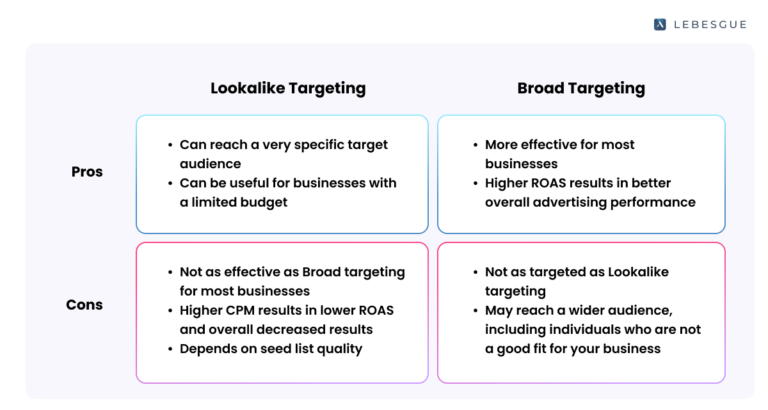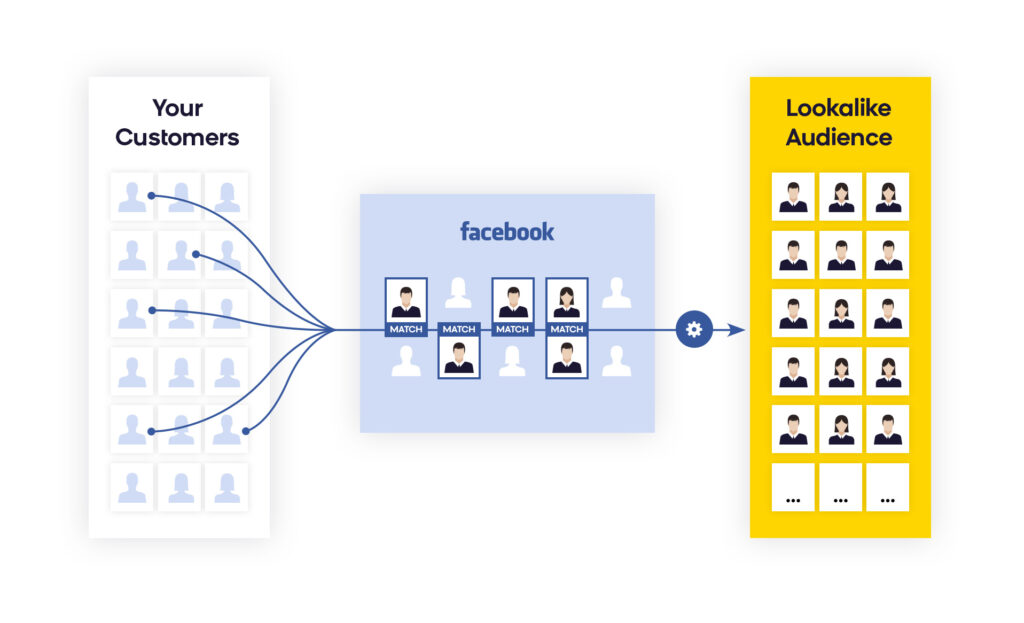
Image from Lebesgue
Lookalike audiences are a powerful tool in the world of digital marketing. Here, we will explore various ways to harness their potential.
Reaching the right audience is essential for the success of your marketing campaigns.
Lookalike audiences allow you to do just that by leveraging the data of your existing customers or website visitors.
When you create audiences that closely resemble your best customers, you can expand your reach to potential buyers with similar characteristics and interests.
Let’s dive into the six different types of lookalike audiences you can create and provide you with expert tips on how to make the most out of them.
You may be new to lookalike audiences or looking to refine your current strategies.
This guide will equip you with the knowledge and insights you need to supercharge your marketing efforts and drive better results.
Read on!
- What are Lookalike Audiences?
- 6 Types of Lookalike Audiences
- Benefits of Lookalike Audiences
- Key Takeaway
- FAQs
- 1. What are lookalike audiences?
- 2. How do I create different types of lookalike audiences?
- 3. What are the benefits of using lookalike audiences in marketing campaigns?
- 4. How can lookalike audiences optimize advertising spending?
- 5. What is a seed audience, and how does it work in lookalike audience creation?
What are Lookalike Audiences?
Lookalike audiences are groups of people who share similar characteristics and interests with your existing customers or website visitors.
When you create a lookalike audience, you can target potential buyers who are more likely to be interested in your products or services.
Lookalike audiences are created using data such as website visitors, customer lists, or engagement on social media platforms.
The algorithm then analyzes this data to find people who share similar demographic, behavioral, and interest-based traits.
6 Types of Lookalike Audiences

Image from Exponea
1. Website Visitors
Website visitors are a great place to start with lookalike audiences.
When you create a lookalike audience based on your website visitors, you can target people who have already shown an interest in your business.
To create a website visitor lookalike audience, you need to have the Facebook Pixel installed on your website.
The Facebook Pixel is a piece of code that tracks user behavior on your website, such as page views, purchases, and sign-ups.
Once you have installed the Facebook Pixel, you can create a lookalike audience based on the data it collects.
2. Customer Lists
Another way to create a lookalike audience is to use your customer list.
Uploading your customer list to Facebook can create a lookalike audience based on your existing customers.
This is a great way to find new customers who share similar characteristics with your current ones.
To create a customer list lookalike audience, you need to have a customer list with at least 100 people.
You can upload your customer list to Facebook by going to Ads Manager and selecting the “Custom Audiences” option.
3. Engagement on Facebook
Engagement on Facebook can also be used to create a lookalike audience.
This includes people who have engaged with your Facebook page, such as liking, commenting, or sharing your posts.
To create an engagement lookalike audience, you need to have at least 100 people who have engaged with your Facebook page.
You can create an engagement lookalike audience by going to Ads Manager and selecting the “Custom Audiences” option.
4. App Users
If you have a mobile app, you can also create a lookalike audience based on your app users.
This is a great way to reach people who have already shown an interest in your business by downloading your app.
To create an app user lookalike audience, you need to have at least 100 app users.
You can create an app user lookalike audience by going to Ads Manager and selecting the “Custom Audiences” option.
5. Offline Activity
Offline activity, such as in-store purchases, can also be used to create a lookalike audience.
When you upload your offline customer list to Facebook, you can create a lookalike audience based on your in-store customers.
To create an offline activity lookalike audience, you need to have a customer list with at least 100 people.
You can upload your offline customer list to Facebook by going to Ads Manager and selecting the “Custom Audiences” option.
6. Seed Audience
A seed audience is a specific group of users provided by the advertiser that serves as the basis for creating a lookalike audience.
The platform analyzes the characteristics and behaviors of the seed audience to identify similar users.
An example is a travel agency that lists its most loyal customers as a seed audience.
The platform then creates a lookalike audience of users with commonalities like demographics, interests, and travel preferences.
This allows the agency to target a bigger audience that’s likely to be interested in its travel packages.
Benefits of Lookalike Audiences
Using lookalike audiences in your marketing campaigns can bring a range of benefits, including:
Better Targeting
Lookalike audiences allow you to target people who are more likely to be interested in your products or services.
This means you can save money on advertising by not targeting people who are unlikely to convert.
Increased Conversions
When you target people who are more likely to be interested in your business, you can increase your conversion rates.
This means you can get more sales or leads for your advertising budget.
Higher ROI
When you target the right people and increase your conversion rates, you can achieve a higher return on investment (ROI) for your marketing campaigns.
This means you can get more value for your advertising spend.
Allowing Data-driven Decision-making
Lookalike audiences are created using data analysis and algorithms.
This data-driven approach ensures audience targeting is based on objective criteria rather than subjective assumptions.
Advertisers can leverage the platform’s data and algorithms to identify users with the highest potential for conversion, resulting in more effective targeting.
Key Takeaway
Lookalike audiences are an incredibly powerful tool that can significantly enhance your digital marketing efforts.
When you create audiences that closely resemble your best customers, you can expand your reach to potential buyers with similar characteristics and interests.
To maximize the benefits of lookalike audiences, it is important to consider the different types available and how they can be used to achieve your marketing goals.
There are various sources that can be used to create these audiences, such as website visitors, email subscribers, or even offline customer data.
These sources can be analyzed to identify patterns and similarities among your best customers, which can then be used to create a new audience with similar traits.
There are also different levels of similarity that can be targeted, ranging from 1% to 10%, with 1% being the most similar and 10% being the broadest.
The level of similarity you choose will depend on your specific marketing objectives and the size of your audience.
When you follow the expert tips provided in this guide, you can supercharge your marketing efforts and drive better results.
Creating lookalike audiences that are highly targeted and relevant can improve your ad performance and achieve a higher return on investment.
So what are you waiting for? Start creating your lookalike audiences today and take your marketing campaigns to the next level!
Contact Flying V Group now for every question you might have. It’s free to talk to us.
FAQs
1. What are lookalike audiences?
Lookalike audiences are groups of people who share similar characteristics and interests with your existing customers or website visitors. They allow you to target potential buyers who are more likely to be interested in your products or services based on data analysis.
2. How do I create different types of lookalike audiences?
You can create various types of lookalike audiences, including Website Visitors, Customer Lists, Engagement on Facebook, App Users, and Offline Activity. Each type relies on different data sources, such as website behavior, customer lists, Facebook engagement, app usage, and offline purchases.
3. What are the benefits of using lookalike audiences in marketing campaigns?
Lookalike audiences offer several advantages, including better targeting, increased conversions, higher return on investment (ROI), and maximizing return on ad spend (ROAS). They also enable data-driven decision-making, ensuring your ad targeting is based on objective criteria.
4. How can lookalike audiences optimize advertising spending?
Lookalike audiences help optimize ad spend by targeting users who are more likely to convert, reducing the wastage of disinterested audiences. This precision targeting results in cost savings and improved ROI.
5. What is a seed audience, and how does it work in lookalike audience creation?
A seed audience is a specific group of users provided by the advertiser to create a lookalike audience. The platform analyzes the characteristics and behaviors of the seed audience to identify similar users. For example, a travel agency can use its most loyal customers as a seed audience to target users with similar demographics, interests, and preferences.






0 Comments